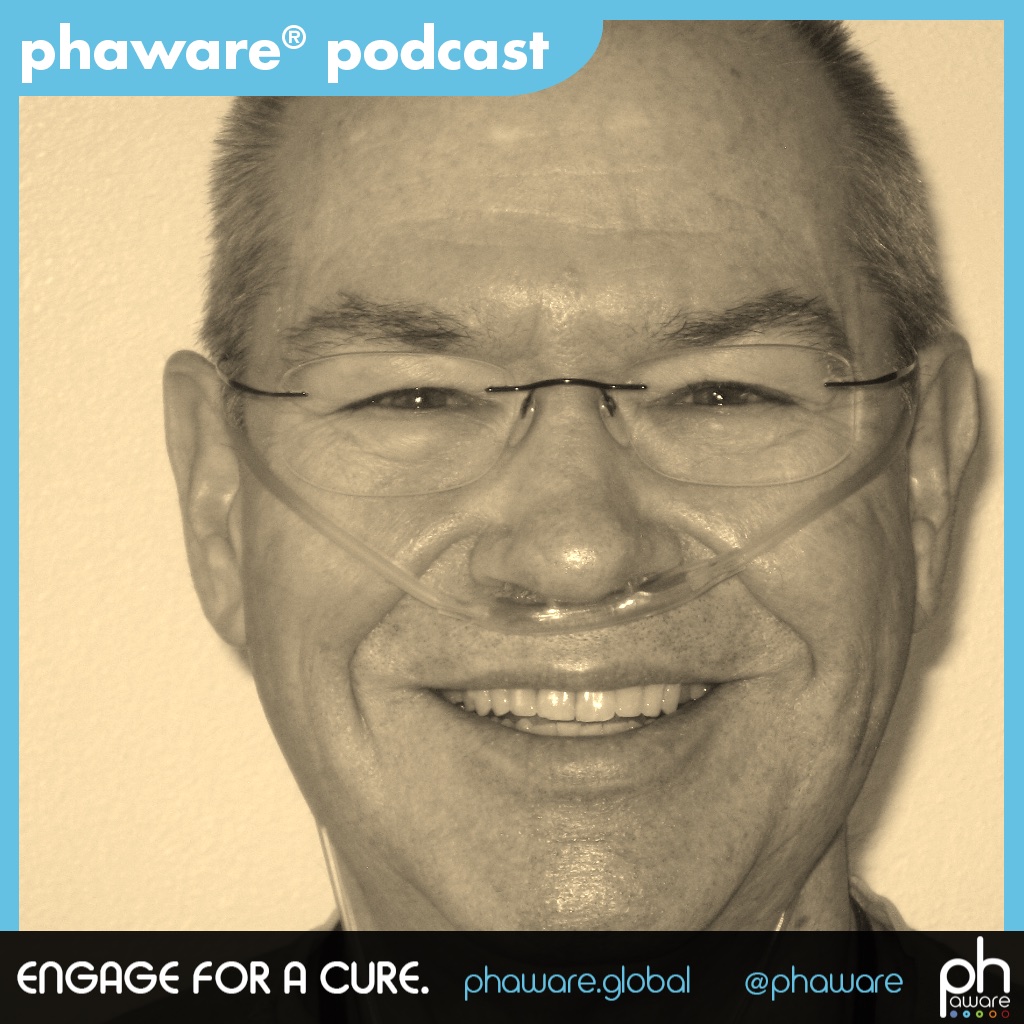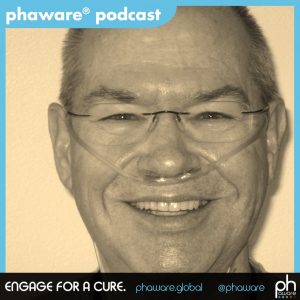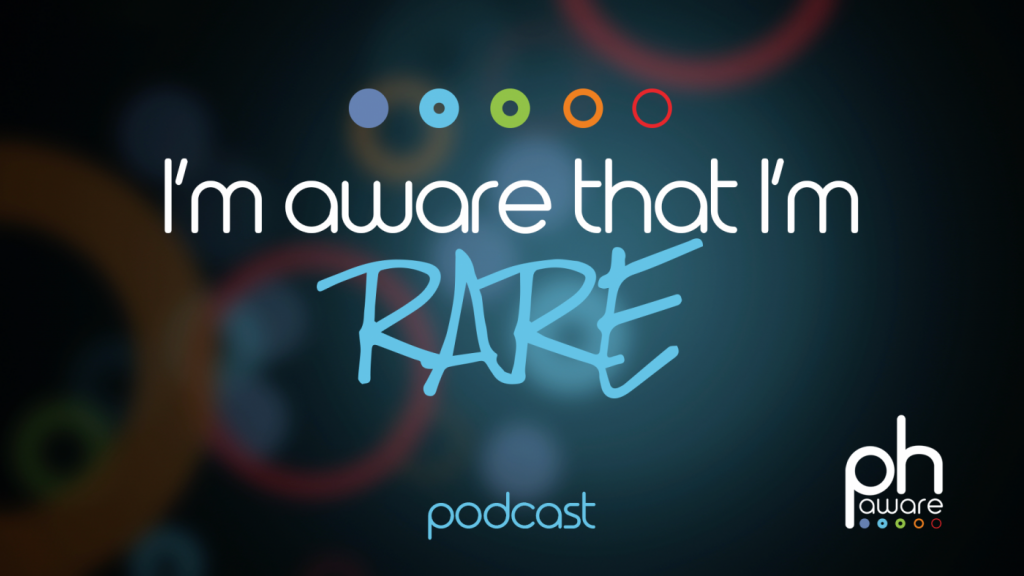Phaware Podcast: Wayne Beall
Written by |

This podcast series, created and produced by phaware, is being offered as a regular guest feature on Pulmonary Hypertension News to bring the voices and life experiences of PH patients, family members, caregivers, healthcare specialists, and others to our readers. You may listen to the podcast directly, or read it via the transcript that runs below.
I’m Aware That I’m Rare: Wayne Beall
The phaware® interview (Episode 103)
Wayne Beall is a CTEPH (Chronic thromboembolic pulmonary hypertension) patient from Idaho. Wayne’s work and “wondering” took him through many Western states, where he learned the love of skiing, but soon symptoms kept him off the mountains. Misdiagnosis is common with pulmonary hypertension and because of that, Wayne got a lot worse before he found a proper PH team. Wayne discusses his multi-year journey that led to a proper diagnosis.
My name is Wayne Beall. I’m from Boise, Idaho.
I’m a local pulmonary hypertension support group leader, co-leader, and participate in online pulmonary hypertension groups. I was diagnosed in January 2005. After over five years of misdiagnosis, my shortness of breath was continuing to get worse, and I felt something was wrong. It caused my CTEPH (Chronic thromboembolic pulmonary hypertension) to progress to an irreversible status, along with extremely high pulmonary hypertension pressures. I had surgery in June 2005 at the University of California, San Diego, which improved my quality of life and longevity.
Oral medication has improved my pulmonary hypertension pressures, allowing me more physical activity, but still requires supplemental oxygen 24/7. For those who are newly diagnosed, I recommend participating in online groups, find a local pulmonary hypertension support group and talk to them. But, most of all, ask lots of questions to become more educated. When I first was diagnosed I was relieved to hear it was not cancer. That was the worst disease I knew of at that time. Now, I know that’s not true. Although there is no cure for pulmonary hypertension, and there is for most cancers, there is medication and surgery for CTEPH that will allow a better quality and longer life.
For those who are newly diagnosed, I recommend participating in online groups, find a local pulmonary hypertension support group and talk to them. But, most of all, ask lots of questions to become more educated. When I first was diagnosed I was relieved to hear it was not cancer. That was the worst disease I knew of at that time. Now, I know that’s not true. Although there is no cure for pulmonary hypertension, and there is for most cancers, there is medication and surgery for CTEPH that will allow a better quality and longer life.
I have found another important part of living longer is to eat well — healthy food in good portions, sleep as much and when needed. Things don’t have to be done today, and find things that you enjoy doing, like hobbies, reading. I ride my ATV, meditate, walk, enjoy life, and choose to have, and live, a positive life. It took more than five years for me to be diagnosed correctly. Many, many doctors, I can’t even remember how many pulmonologists and cardiologists. Each one would do a bunch of tests, including some right heart catheterizations, and they would each say, “I don’t know what’s wrong with you. I don’t know how to help you,” so I went to another doctor, at least six or eight pulmonologists, and cardiologists, so 12 to 16 total different ones, and I was diagnosed, actually, by accident.
‘Your pressures cannot be that high’
One of the last pulmonologists that I had decided he wanted to do a CT scan, and I’d never had one done before. I’d had several right heart catheterizations, and every one of them the doctor that was doing it would say, “There’s something wrong with our equipment. Your pressures cannot be that high. I don’t know what’s wrong with you.”
This one decided to do a CT scan, and that’s when they find the clots. At that point, that was the end of 2004, but they would not let me leave the hospital because of the clots, so I was literally in the hospital for three days doing nothing, just monitoring me. On the third night that I was there a cardiologist came in who I had never seen before, never talked to before. I didn’t even know who he was. He was very young at the time. He just walked in my room late at night, looked at my chart, and then said, “I know what’s wrong with you and I know how to fix it.”
I go, “How the hell could you possibility know what’s wrong with me? You haven’t done any tests. You haven’t talked to me. All you did was read my chart, and you think you know what’s wrong with me?” He goes, “When I was an intern for cardiology at the University of California San Diego, I had break time with another intern who was a pulmonologist studying pulmonary hypertension. We sat and talked about symptoms for different diseases, and he told me about CTEPH and the symptoms, and you have those symptoms, and you need to go to a pulmonary hypertension specialist in Seattle, or Salt Lake City, have that discussion with them, then go to San Diego to have surgery.”
I was so astounded I couldn’t speak. I had no idea what he was talking about, first of all, and second of all, after all of this time of doctors saying, “I don’t know what’s wrong with you but I know there’s something wrong,” someone said, “This is what’s wrong you, and this is how to fix it.” It was totally amazing to me. The problem, though, was I couldn’t imagine a doctor, either pulmonologist or cardiologist, not knowing what was wrong with me. It just astounded me there were medical people out there who couldn’t figure it out for that long a period of time, and I kept getting worse that whole time.
It was kind of like, “Do I need to move to a bigger city? Do I need to find a specialist who knows something I don’t know anything about? How am I going to solve this, because it’s getting worse?” As soon as he said that, though, I knew. I resonated with the fact that he knew what he was talking about. He knew what was wrong with me, and he knew that solution would fix me, at least sort of.
I had the surgery in June 2005. Because I was so long misdiagnosed the clots continued to go through my heart into my lungs. Fortunately, the clots did not go into my brain to give me a aneurysm or stroke, and they went into my heart which, technically, is not better. But I guess it’s kind of it is better. The point being, they continued to build up and go deeper, which when they originally (in San Diego) were trying to figure out whether they could help me or not, whether I was a candidate for surgery or not, they told me beforehand they knew they were not going be able to get all the clots out, that I would never be able to breathe, and probably run or do any extensive physical activity without running out of breath, so I may be on oxygen for the rest of my life.
At that point, I knew it because they told me when I got there, “We think that you have maybe three months to live if you don’t have this surgery,” so I was pretty much ready to do the surgery that day. Fortunately, they were able to get enough clots out, and with the oral medication for pulmonary hypertension, I was able to now say that, technically, I don’t have pulmonary hypertension anymore. It’s ranging between 34 and 37 in my pressure. It was 125 before surgery. That is evidence that it’s beneficial, but prior to surgery I have been on supplemental oxygen 24/7, especially with any kind of physical activity or exertion. It’s because the residual clots that are still there.
What I’ve learned through this experience is that anyone who even has a possible inkling that they might have blood clots, whether in your lungs or not, have a pulmonary hypertension specialist check for you immediately. The longer you wait the more likely you are to have long-term issues and less mobility, a shorter life, and it’s important. Just do it. The important thing is to follow the symptoms that every one of us have, even with just regular pulmonary hypertension, but they have to be aware, the doctors, and nurses, and any medical people, have to be aware, initially, that that is a symptom, exactly the same idea or path that my cardiologist took when he was an intern down in San Diego. You don’t have to learn about, and study about, the disease, but know the symptoms, and then direct to the proper specialist to help resolve the issue. Know the symptoms, that’s the key.
Pulmonary hypertension is a progressive disease and it could kill you, but if you get some kind of medical attention for that issue, once you are sure you have pulmonary hypertension with a right heart catheterization, and it is validated by a doctor with the pressures, make sure you get a copy of that test results and the doctors notes, and immediately go to a pulmonary hypertension specialist, because the sooner you start getting it resolved, the longer life you will have, the better quality of life you’ll have, and the more you’ll be able to do physically throughout your lifetime. Don’t wait.
My name is Wayne Beall, and I’m Aware That I’m Rare.
EVERYBODY HAS A STORY. WHAT’S YOURS?
Phaware global association wants to share your pulmonary hypertension story with their engaged global audience. Whether you are a patient, caregiver, or medical professional, they are enlisting PH community members from around the world. Visit www.phawarepodcast.libsyn.com/contact to share your story and to be considered for a future episode. Never miss an episode with the phaware® podcast app. Learn more about pulmonary hypertension at www.phaware.global. #phaware
***
Note: Pulmonary Hypertension News is strictly a news and information website about the disease. It does not provide medical advice, diagnosis, or treatment. This content is not intended to be a substitute for professional medical advice, diagnosis, or treatment. Always seek the advice of your physician or other qualified health provider with any questions you may have regarding a medical condition. Never disregard professional medical advice or delay in seeking it because of something you have read on this website. The opinions expressed in this column are not those of Pulmonary Hypertension News or its parent company, Bionews Services, and are intended to spark discussion about issues pertaining to pulmonary hypertension.






Kristin Philipps
Hello. I have an 18 year old daughter who was diagnosed with PH about 9 years ago. It looks to be idiopathic. as far as i remember they havent checked for blood clots. i dont remember a chest CT, only chest x-ray. about 3 years ago she coughed up quite a bit of blood (but just one time). Do you recommend more testing in your experience?
thanks,
kristin philipps